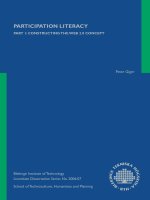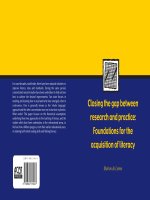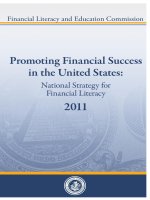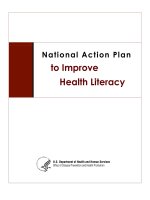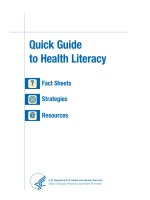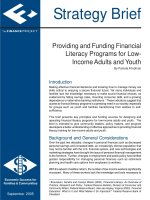120_DisciplineSpecific Literacy
Bạn đang xem bản rút gọn của tài liệu. Xem và tải ngay bản đầy đủ của tài liệu tại đây (427.9 KB, 24 trang )
TEACHING MATH TO
YOUNG CHILDREN
TRY TO MEMORIZE THESE
SYMBOLS
Top to bottom, left to right: 1, 7, 12, 3, 6, 4, 5, 10, 8, 9, 11, 2
NOW TEST YOURSELF:
•This is a taste of what a child
has to accomplish when learning
numbers.
MOST IMPORTANTLY –
HAVE A POSITIVE ATTITUDE ABOUT LEARNING MATH!
TEACHING MATH
• MATH CONCEPTS SHOULD BE
CONCRETE & MANIPULATIVE
• CONSIDER PRIOR KNOWLEDGE
• CONSIDER CHILDREN’S INTERESTS
• HELP CHILDREN WITH NEW
VOCABULARY
• SOCIAL INTERACTION IS IMPORTANT
CONCEPT: What are numbers?
•
Rote counting
•
Identify symbols
•
Count objects
•
Tell how many
•
Telling which one
CONCEPT: Counting
• 1st, 2nd, 3rd then have them reverse it
• Big, bigger, biggest
CONCEPT: Measure up
• Measurement comparisons
• Measuring units: inch, pound, quart
CONCEPT: Getting around
• Spatial relations
• Maps
• Follow directions
CONCEPT: Patterning
• Repeat & growing patterns
• Logical reasoning
• Eliminate ones that are different
CONCEPT: Seriating
• Size relationships
• From tall to short
CONCEPT: Classification
• Sort boys/girls
• Sort children by hair color
• Sort different types of animals
CONCEPT: Sequencing
• Sequence the order of pictures in a story
CONCEPT: Symmetry
• Fold and color lines of symmetry
• Use mirror to draw
CONCEPT: Shapes
The shape of things
• 2 & 3 dimension
• Shape identification
SHAPES cont’d
• Spheres, cubes, rectangular, prisms, cylinder (use
correct names)
• Pictures of shapes need name written on it (language
development)
• Play game & move # of spaces of the # of sides
(circle=0)
CONCEPT: Money
Activity: Read “Smart” by Shel Silverstein
• Children can start to identify coins
• Playing store helps children gain a sense of the cost
of things
“Just write a check, Mom”
CONCEPT: Time
• Children can start to read a clock
• Time concepts must relate to their world
– The length of their favorite TV show
Have a digital clock next to a face clock
CONCEPT: Statistics &
Probability
• Graph types of bugs found, growth of plants, etc.
• Predict how many flowers will bloom from seeds
planted.
WHAT ABOUT CALCULATORS &
COMPUTERS
• Children should be allowed to explore calculators.
• But solving the problem should be the focus.
• Computers enhance learning if child is required to
interact and think logically.
GUIDELINES
• Oral language is important in development of math
skills.
• Children can have long attention spans.
• Few strong divides between 4 & 5 year olds.
• Repetition is important.
• Mistakes are good & a natural part of learning process.
• Simple activities can be complex.
MATHEMATICAL
CLASSROOM MATERIALS:
•
•
•
•
•
•
•
•
•
•
Felt & magnetic numbers & shapes
Peg boards
Calendars
Ruler, measuring tapes, measuring cups, scales
Play money & cash registers
Timers, clocks, Thermometers
Counting rods
Light & heavy objects
Buttons, keys, spools
Puzzles
